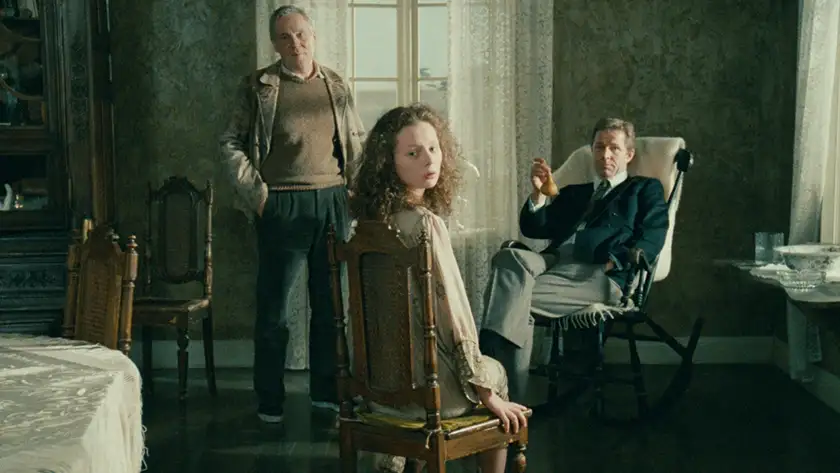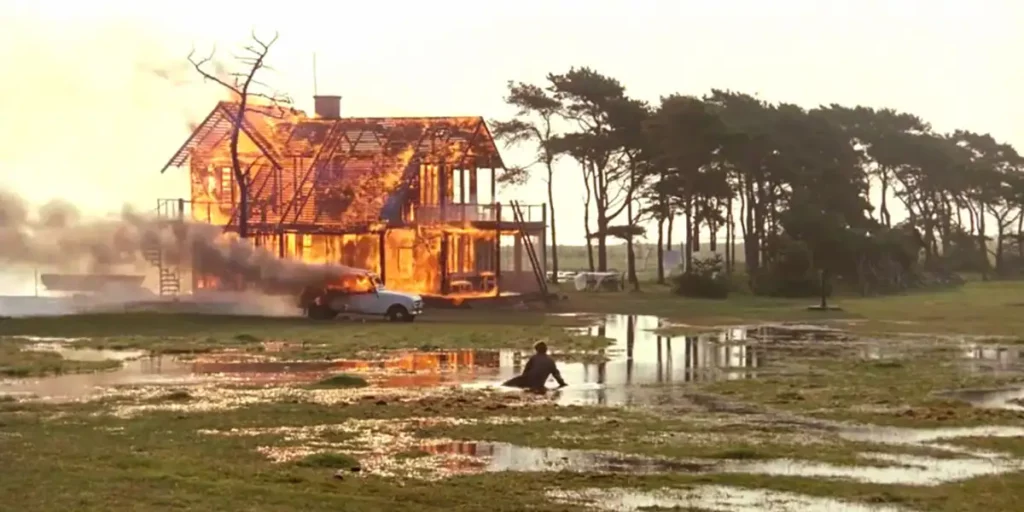The Sacrifice is Andrei Tarkovsky’s own epitaph, where he finds his own voice in someone else’s work and summarizes a life in film well-spent.
In 1979, acclaimed Soviet filmmaker Andrei Tarkovsky defected from the Soviet Union to Sweden to pursue greater creative opportunities and expect his artistic vision more freely. Despite being hailed as one of the greatest filmmakers of all time, Tarkovsky only made seven feature films, and was always held back by the communist government of his era for what he could show and what ideas he was allowed to express. His final film is The Sacrifice from 1986, a movie in Swedish intended for Ingmar Bergman but taken by Tarkovsky to make his own. A film all about religious turmoil, personal trauma, and familial conflict is the perfect note to go out on, and the title seems to imply it was the director’s own sacrifice. As we head into the Easter season, a time all about sacrifice and meditation, this may be the perfect film to watch for the period of Lent and contemplate what it means to make a sacrifice, in all senses of the term.
The film is about a man named Alexander (Erland Josephson) undergoing an existential crisis when he hears a report of what he believes to be the outbreak of World War III. He shuns his wife Adelaide (Susan Fleetwood), sequesters himself from the outside world, and tries to bargain with God to reconcile with his death. Alexander feels like a self-insert for Tarkovsky, who was himself a man who threw away everything for the medium he loved. His paranoia and devotion to his final gesture feel like a reflection of the director’s own views on death and dying. The character himself is an actor who turned to writing instead, operating behind the scenes as a way to express his ideals and musings about life and its meaning. As a director, Tarkovsky would know about artistic expression and its limitations all too well.
Alexander throws everything away to face the end by taking nothing with him. Still, a community comes together with his family to make something happen and have their last days be meaningful. The opening scene of the movie is Alexander planting a tree in his front yard, symbolic of life everlasting and a personal contribution to the world in the face of doubt. Even when the world is about to end, Alexander still rises to plant his tree. This parallel can be seen with Tarkovsky himself, and feels like a visualization of the struggle he was facing in making the movie. Within mere months of this film’s release, Tarkovsky was dead from lung cancer, believed to have been acquired from radiation exposure from the set of his earlier film Stalker. He was a method man who took every frame seriously, and this dedication to film is what killed him. Still, he made more movies and even in his dying moments, was able to create a masterpiece.
A knowledge of Bergman is not necessary to appreciate the film, but it does add to the mystique of it. Bergman and Tarkovsky are similar in style, employing long takes and metaphysical themes of death and hardship, as well as persistence of the human spirit. Main star Erlnd Josephson himself acted with Bergman in films such as Cries and Whispers and Scenes from a Marriage. In spite of The Sacrifice being a continuation of a Bergman project, this is one of the most personal of Tarkovsky’s works. His devotion to the craft was at the expense of his life and gives the title a whole new meaning if one believes the man knew his time was short. After all, a sacrifice has to be voluntary, right?

Tarkovsky is a fascinating filmmaker because he was a devout Christian living in the Soviet Union, one of the worst places to be one. All of his films aim for the spiritual, the metaphysical, and holding out for salvation even if one does not know if it can be found. The Sacrifice is a culmination of his beliefs and aspirations, and whether intentional or not contains many parallels and subtle nods to his other movies. Alexander possesses an Orthodox painting resembling those of Andrei Rublev. The approach of an unseen threat and the main character’s paranoia call to mind Solaris. The presence of the precocious youth Little Man (Tommy Kjellkvist) and his perseverance in the face of danger has this film come full circle by calling back to the director’s first project Ivan’s Childhood. Many of Tarkovsky’s other trademarks, like the use of classical music and continuous long takes to focus on environment and mood, are present as well.
Andrei Tarkovsky’s movies are all about the persistence of art in an uncertain, unforgiving environment bent on destroying them. The Sacrifice was produced in Sweden, where he had more creative freedom, but was still under limitations due to his cancer diagnosis and budget problems. Much like Alexander’s tree, Tarkovsky still felt he had to make the movie and make it his own. He was able to replicate Bergman’s style and imbue it with his own voice, making for an experience combining the best of both worlds. The nonlinear narrative and transitions from Alexander’s internal thoughts to the world at large capture a sense of desperation and anguish, which feels like Tarkovsky’s own emotions made tangible. Such grand emotional baggage can only shine through in the medium of film, and Tarkovsky knew how to use the medium to tell his own story.
Like most of Tarkovsky’s filmography, The Sacrifice is an acquired taste. His slow pacing and use of long takes may be a bit overwhelming or dull to some. However, those who enjoy the experience and artistry of film will find there is no one better at immersion and displaying emotional pathos than Andrei Tarkovsky. His films are more like meditation sessions than linear stories or cohesive plotlines, more about the experience than following a set path. It may seem like a tiresome, troubling film in isolation, but with the context of the rest of the director’s flawless filmography, it becomes a cherry on top of an illustrious career. This is not a good first Tarkovsky since so much of it is rooted on knowledge of his trademarks and visual appeal, but for those who want to have a marathon, make sure this is the note to end it. Andrei Tarkovsky deliberately planned it as a grand finale.
The Sacrifice is now available to watch on digital and on demand.

